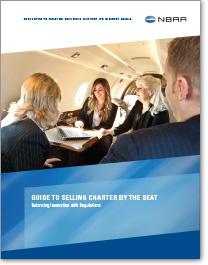June 22, 2017
New technology, such as mobile apps and crowdsourcing platforms, has provided Part 135 operators and brokers with additional tools for selling individual charter seats, but it hasn’t changed the regulatory standards to which they are held. Operators must still navigate Department of Transportation (DOT) and FAA rules that are not always clear, and are subject to fact-specific interpretation by the agencies, with the threat of stiff enforcement penalties ever present.

In NBAA’s new resource, Guide to Selling Charter By The Seat (PDF), members will find information on what operations are permitted under Part 135, the differences between FAA and DOT enforcement policies and specific regulatory considerations for scheduled, on-demand and public charter air transportation.
Co-author Paul A. Lange, managing member of the Law Offices of Paul A. Lange, LLC., said the new resource will give Part 135 operators a better understanding of not only what rules apply to them, but where to find them in FARs such as Part 110. This is critical, he said, because if selling seats is not done properly, “you risk the pilots’ as well as the air carriers’ certificates being revoked by FAA, as well as substantial fines by DOT.”
For example, failure to obtain appropriate authority from either the DOT or FAA for selling individual seats on a flight can result in stiff penalties. Those include up to $11,000 per regulatory violation, per flight leg, from FAA, and up to $32,140 per violation from DOT, which can be per-passenger, as well as an additional $32,140 per day that each violation continues. Compounding this is that FAA and DOT can each issue their own civil penalties separately and simultaneously.
“Their job as prosecutor is to be a deterrent and part of that is to get as high a number as they can. Looking at each passenger multiplied by each regulation violated, multiplied by each flight, you can very quickly reach millions of dollars,” said Lange.
However, he noted, the most extreme penalties rarely surpass hundreds of thousands of dollars and the more likely scenario is FAA taking emergency action to revoke an air carrier certificate. “Rather than millions of dollars in fines, they may just take away your ability to do business,” he said.
Beyond ensuring that regulations are followed by your company, co-author Dayton Lehman Jr., president of Capitol Business Solutions’ aviation group, said that operators working with brokers must also be vigilant that their business partner is adhering to proper selling methods.
“If you’re an operator dealing with a broker, you need to be cognizant of what the broker’s doing when they contract with you to operate that flight, because DOT has a maxim called ‘facilitating’ – if DOT finds a broker is operating unlawfully and thinks you knew or should have known about the broker’s unlawful conduct, it might charge you with engaging in an unfair and deceptive practice on the basis that you facilitated the broker’s conduct,” Lehman said.


 International Business Aviation Council Ltd.
International Business Aviation Council Ltd.